- Home
- Jeff Mariotte
Serpents in the Garden Page 10
Serpents in the Garden Read online
Page 10
Krell was taller than Apella, and he walked with a brisk, long-legged stride. Apella had a hard time matching his pace, and he often found himself scampering a few paces to keep up.
“. . . tried to capture the one you wanted, the one called Kirk,” Apella was saying. Krell forged ahead down a crowded pathway, eyes front, not slowing for anything. Victors knew enough to get out of the Klingons’ way, even if most of them still didn’t know whom the Klingons really were or understand the significance of the spaceport. His fellow Victors, Apella feared, were mostly simple people, incapable of higher reasoning.
“Tried?” Krell echoed.
“Yes. A valiant attempt. Unsuccessful, in the end, I’m sorry to report. We lost many warriors in the attempt, but they killed one of those who were with him, as well as some Freeholders.”
“Still, you failed.”
Krell’s scornful tone stung, but Apella was getting close to his point. “Yes, honored one. This time. We will try again, with more warriors.”
Krell made a dismissive noise. It might have meant something, in his language—Apella had never learned more than a handful of those harsh, guttural words—but if it did, Apella was glad he didn’t understand. Then Krell said, “If you knew how Klingons reward failure . . .”
That, Apella understood. He was just as glad that Krell had not gone into greater detail on that score. “If we had better weapons, though . . . more advanced . . . we would have no trouble with them. With the sorts of weapons you keep for yourselves, we could storm Freehold itself. We could take the town, increase our labor pool, and speed up production.”
“You are the worst kind of fool, Apella!” Krell snapped. “You have ideas, but you lack the ability to know if they are good ones or bad. Laborers are resources, just like the ore itself. They must be used wisely. You would run them all ragged, but we need that mine to remain operational, to supply the empire for decades.”
“Yes, of course, Krell. I merely thought—”
“Perhaps you should do less thinking and more overseeing. Make the workers you have work harder, but tend to the breeding stock so you will never run out.”
Apella recognized that the conversation was veering away from his intended target. “But the weapons,” he said, desperate to swing back around to the topic at hand. “With better weapons, we could—”
“More foolishness!” Krell interrupted. “You will have put Kirk on guard. I have reported his presence to Qo’noS. They will respond, in due time. Better that you had not meddled at all.”
“I meant only to show you how we could handle such matters.”
Krell laughed. “And you did. You showed me exactly how well you could do.”
“Success is never certain,” Apella argued. “Only failure is certain. If a man does not try, he is certain to fail.”
“But apparently if you try, the result is the same.”
They had arrived at the spaceport. Klingon guards, wearing the kind of weapons that Apella wanted—what Krell called “disruptors”—stood watch at the gate. When they saw Krell approach, they drew back the gate and stepped aside. “He is with you?” one of the guards asked Krell, gesturing toward Apella. “The colonist?”
Krell turned toward Apella with a dismissive, almost contemptuous look on his face. “Are we finished?”
“The weapons?”
“If I feel you have a need for them, I will provide them. But I would rather you focus on the mine and leave such matters to me.”
“But, Krell—”
Rage clouded the Klingon’s face, and he raised his hand. Apella saw the blow coming but didn’t know how to dodge it, or even if he dared. That might only infuriate Krell all the more. The back of Krell’s hand swung toward him, and the Klingon stopped it mere inches from Apella’s cheek. There the sting was only emotional, and worse than a physical blow. “Enough,” Krell said. “Back to your mines.”
He turned on his heel and the guards clanged the gate shut behind him, then glared at Apella like he was a dog standing outside a butcher shop. As he walked away, he heard the guards speaking Klingon behind him, and laughing.
He had tried to be a partner to Krell, to make the city of Victory a partner to the Klingon Empire. He had never imagined that Krell thought of Neural as a colony, or of him as a subject. But the way Krell had swung at him . . . he could easily have struck him.
He was not a partner, he was simply a means to an end. Everything the Klingons did was in service only to themselves, not to Neural. And Apella himself would never, he was coming to believe, attain the power and prestige due him. Even if every Victor dropped to the ground and genuflected when he passed by, all it would take was another demonstration like that, from some Klingon or other, to reveal the truth. He was a figurehead, more puppet than partner.
And it was too late to do anything about it. After their initial overture, he had invited the Klingons in. He had made his choice in ignorance, but it was made, and there could be no turning back. He would just have to take what power was offered, with the knowledge that it might be snatched away at any moment.
He didn’t like it, but when he got closer to the mine office, away from the glares of the Klingons, people recognized him and greeted him with respect, and in a few cases, with something like fear.
That, Apella did like. He would suffer almost any indignity to maintain that status. He worked his face into a scowl and headed for his desk.
* * *
Scott knew he was in trouble, but he didn’t know how much trouble until he entered Admiral Kucera’s office. The admiral sat behind a desk you could almost have landed a shuttle on, with her mouth set in a grim line and her eyes alert but not friendly. Captain Willard Decker sat in another chair, and although he was usually quick to smile, he was not smiling now. There were two other officers in the room, but Scott didn’t know them and no one introduced them. Large windows gave an expansive view of the bay and the Golden Gate Bridge arching across it. The water glinted in the sunlight, throwing light daggers at the sky.
“Commander Scott,” the admiral said. “Have a seat, please. Thank you for joining us.”
I had a choice? he thought. Instead, he said, “Of course, Admiral.” He took the only empty chair and nodded to Decker and the other two as he sat.
“Scotty,” Decker said. “We appreciate you taking time out from your important work. How’s she coming?”
“I could use more cooperation and less red tape,” Scott said. “But that’s always true, isn’t it?”
“We’ll try to make that happen,” the admiral said. Her voice had a husky edge to it, a rasp that made Scott think she had not always piloted a desk. She sounded like she had lived hard. He didn’t know much about her background, but Decker seemed to respect her, and that counted for something. “But I understand you’ve been a bit distracted, lately. By another matter.”
“If ye mean me tryin’ to find out what’s happened to Admiral Kirk, then you’re right, Admiral. And I’ll nae quit doing that until I get some answers. Somebody’s got to know.”
“You’re wading into some difficult waters, Scotty,” Decker said. “We’re here for your own good, whether you know it or not.”
“Forgive me if I’m not especially cheered by that. From your faces, it looks like I’m here for an inquisition.”
The admiral allowed herself a smile, but it didn’t reach her eyes. She had a firm jaw and those eyes were a steely gray, and Scott took her for someone not to be trifled with. “Not at all,” she said. “We understand your concerns, and we would like to allay them. But there are . . . complicating factors.”
The phrase sent a chill through him. “Is he all right? Admiral Kirk?”
Kucera hesitated, and he could see by the tilt of her head and the furrow of her brow that she was considering her answer. Before she spoke, she shifted her gaze to the two officers who had not yet been introduced. “Gentlemen, could you give Commander Scott and me the room?”
The three men left
the room without comment. When the door closed behind them, Admiral Kucera met Scott’s gaze again. “You and Admiral Kirk are very close,” she said.
“Every single person on his crew feels that way about him. He’s a remarkable man.”
“He is indeed,” Admiral Kucera said. “And those of us in Command appreciate that.”
“So where is he? Why can’t you tell me that?”
“Just what do you think we’re doing here, Commander Scott?”
“I’m still tryin’ to figure that out, Admiral.”
“My aide, Ensign Fairweather, says you buttonholed her the other day asking about Admiral Kirk. I’ve heard from others, as well. The truth is, while we’d prefer that nobody be talking about him just now, thanks to you, he’s become a topic of conversation. Commander, Kirk is on a very secret mission. Secret, I might add, at his own request, though I agreed with his reasoning and agreed to help maintain the secrecy.”
“So you’ll not be tellin’ me where he is, because it’s a secret?”
Admiral Kucera sighed. “He went to a planet called Neural. You may remember it, although according to our records you did not visit the surface.”
“Aye,” Scott said. “I remember it, all right. The captain confused me when he called in, ready to return to the ship.”
“Confused you, how?”
Scott didn’t know how much more he should say. He remembered the words exactly. Kirk had asked how long it would take to supply a hundred flintlocks. Scott had thought he’d misheard—whatever the captain said, it could not have been “flintlocks,” because that made no sense. He’d asked for clarification, and Kirk had said, “A hundred . . . serpents. Serpents for the Garden of Eden. We’re very tired, Mister Scott. Beam us up home.”
As it turned out, the captain had said flintlocks, and after he’d returned to the Enterprise, he made his orders clear. Doctor McCoy had insisted that providing guns was a terrible idea. But Kirk had made a promise to a friend, and he said that without the guns, his friend’s people would be slaughtered. He was the captain, so Scott had manufactured flintlocks according to historical Earth specifications, and the captain took them down to the planet.
Which made him complicit, if providing those weapons had caused a problem of some kind. He had no clue as to what that problem might be, but if James Kirk had returned to Neural in secret, it likely wasn’t to sightsee.
“Never mind,” he said at last. “Can you tell me anything about his mission?”
The admiral steepled her fingers under her chin. “I shouldn’t, no. If Kirk chose not to tell you, he must have had a reason.”
“Then why are you telling me at all?”
“Because I’m concerned, Commander Scott. We’ve had no communication from him. He took civilian transport there and presumably made some sort of arrangement for the journey back. That part, I didn’t like, although I understood his decision. Since he’s been gone, however, it’s been weighing on me. I don’t think he took enough people with him, and I don’t like the idea that Starfleet can’t reach him. I want someone to go to Neural, to back him up or pick him up—preferably the latter. Since you have made it very clear that you’re not going to stop rattling cages until you know where he is, I thought that perhaps you’d like to be part of that mission.”
“Admiral Kucera,” Scott said, a smile spreading slowly across his face, “try and stop me.”
* * *
Uhura and Chekov were on the Enterprise bridge, but they looked up when Scott entered from the turbolift. “That’s a wery big smile,” Chekov observed.
“I suppose it must be.”
“Is something funny?”
“I wouldn’t say that.”
“It is an unusually broad smile, Scotty,” Uhura pointed out. “Even for you. Is there news about the admiral?”
Scott nodded. “Aye. You two need to pack your bags,” he said. “We’ll be taking a wee trip.”
Thirteen
The search party gathered at the gate shortly before the sunrise. Kirk, Rowland, and Burch were there, as was Meena, who told the others their belief that Nyran had intentionally left the fields, rather than being a victim of the attack. The overall plan didn’t change—the party would begin their search in Providence Valley, at the field where Nyran had last been seen, and would look for tracks or any other clues as to where he might have gone, whether of his own free will, or taken by force.
The trek into the valley was considerably more subdued than the last. Conversation was hushed; nobody laughed or sang. Their mission was a serious one, with a potentially grim outcome, and while the Freeholders claimed optimism, none engaged in small talk.
By the time they arrived, the sun had cleared the hills and the valley gleamed with brilliant clarity. Kirk looked at the green fields, the meandering river, once more struck by how lovely the view was, a pastoral scene like something out of Earth’s long-ago. He knew that although ancient times on Earth had been dangerous times, with the exception of a few major wars that killed millions, the chances that anyone on Earth would die from an act of violence had fallen, century by century. The planet was largely at peace now, and violent death rarer than ever.
Neural, though, had far to go to reach that state, if it ever would. With its population pushed toward ever more bloodshed by the interference of Klingons and Federation alike, Kirk worried that the idyllic scenery would be replaced by ever gorier battlefields.
Arriving in the valley, the twenty members of the search party fanned out, looking for any sign of the boy. Blood still darkened the earth where some had fallen. Plump fruit weighed heavily on limbs, left there by the harvesters when the Victors had attacked.
Nyran was not there. Searchers checked every row, looked under bushes, even walked down to the slow-moving river and waded across. The flow was not strong enough here to carry a body far, but they searched in both directions for a time.
Finally, a shout of discovery went up. Kirk ran to the edge of the field, farthest from Freehold and from where the Victors had attacked, where a woman was calling out and waving. Several others reached her at the same time.
“What is it?” someone asked.
“Tracks,” she said, pointing out distinct footprints in the soft dirt. “Look, they lead off toward the hills.”
“They could be anybody’s,” Burch suggested.
“Nobody else went that way. We were all focused on the harvest, until the attack. And then we went the other way, toward the slavers.”
“She’s right,” Kirk said. “These tracks weren’t made by somebody running. Walking fast, possibly—trying to get away without being seen.” He pointed toward a stand of trees a dozen yards away. “He only had to reach those, and then he’d have been almost impossible to see from here.”
“Why would he have done that?” Turan asked. He was one of the Hill People Kirk had known on his first trip, an older man with stooped shoulders, his platinum locks going gray. He was still strong, with unflagging energy that Kirk admired.
“Nyran has always had his own mind,” Elanna said. “Even as an infant, he had ideas I could not comprehend. Whatever he did, he had his reasons.”
“Let’s see where he went from there,” Kirk said. “Maybe we can figure out what those reasons were.”
* * *
The trees offered no clues as to Nyran’s goal or his destination, but the searchers found his signs: footprints and snapped twigs and crushed grass, a thread caught on a thorn in one spot, a tumble of rocks in another, their long-buried undersides turned toward the sky by a mislaid foot. Nyran’s trail led out of the valley, across another, and up the thickly forested slope of a tall mountain.
The search party was drawn out in a line, those in front studying the ground for any further trace of the boy, those behind alert for the various dangers the forests of Neural held, while also watching for anything missed by those ahead. Kirk was near the front, Rowland midway back, Burch bringing up the rear. The admiral glanced back and s
aw her, wary as ever, constantly scanning the trees in every direction.
But when the mugatos attacked, they took everyone by surprise.
There were two of them, one slightly more massive, with arms like tree trunks and powerful legs and a roar that echoed up and down the mountainside. That one came first, charging at the front of the search party. Guns were raised, but the beast attacked too quickly, and the couple of shots fired went well wide of their target. During the chaos of the attack, when everyone was focused on the mugato at the front, the other struck from behind, approaching with such unexpected quiet that even the ever-wary Burch was caught off guard.
As if recognizing the greatest threat, the creature went for her first.
Kirk’s attention was on the larger of the two. He swung the rifle by its barrel, and its stock crashed into the thing’s jaw. Blood and teeth and spittle streamed from its mouth, and the mugato turned toward him with a startled growl. As it advanced on Kirk, Rowland and Meena both opened fire. Their shots were loud and filled the air with acrid smoke, and the beast took a couple of steps back, blood blooming on its white fur like red roses in springtime. Behind him, Kirk heard screams and shouts and more gunfire, but he didn’t dare look back. The mugato shook off the impact of the two rounds and charged again.
This time Kirk had his rifle at the ready. He fired, levered another round into the chamber, and fired again. The bullets slammed home, but still the creature came, arms out, clawed hands raking empty air. It came near enough that Kirk could smell its hot, foul breath, the rank muskiness of its body. He squeezed the trigger again, but the weapon only clicked, empty.
He braced for the assault, knowing nothing could break the mugato’s momentum now. Its last couple of steps were an awkward half-shuffle, and then it was falling onto Kirk, as inevitable as the toppling of a redwood tree sawed off at its base.
Kirk was immersed in fur and stink and hot, acidic saliva dripping onto him and burning his flesh where it landed. He felt the beast breathe its last and slump atop him, dead weight, the only life left in it coming from the insects infesting its fur. Kirk tried to shove it aside, but it was too heavy and he couldn’t get any leverage. He couldn’t see anything but dirty white fur, but he heard voices, slightly muffled, and then he felt the weight lifting. He was able to get his arms underneath the thing and help push it away, enough that he could roll out from underneath.

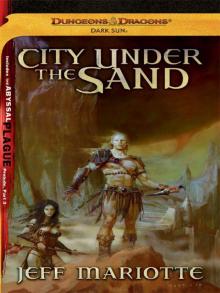 City Under the Sand
City Under the Sand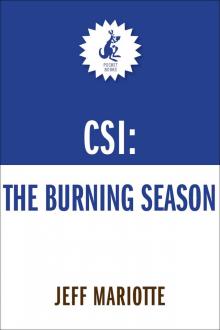 The Burning Season
The Burning Season Sanctuary
Sanctuary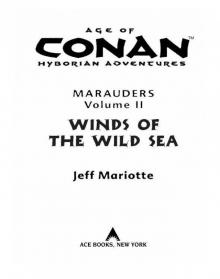 Winds of the Wild Sea
Winds of the Wild Sea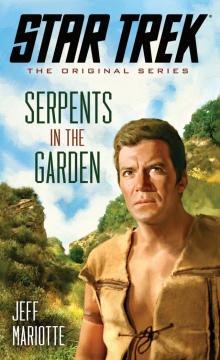 Serpents in the Garden
Serpents in the Garden Close to the Ground
Close to the Ground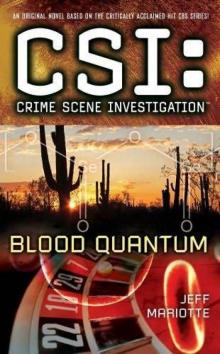 Blood Quantum
Blood Quantum Brass in Pocket
Brass in Pocket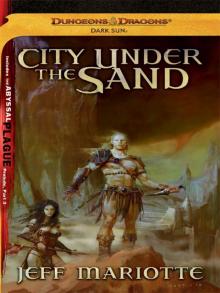 City Under the Sand: A Dark Sun Novel (Dungeons & Dragons: Dark Sun)
City Under the Sand: A Dark Sun Novel (Dungeons & Dragons: Dark Sun)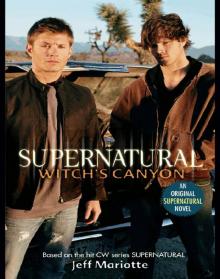 Witch's Canyon
Witch's Canyon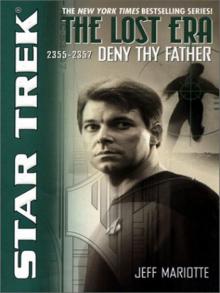 STAR TREK: The Lost Era - 2355-2357 - Deny Thy Father
STAR TREK: The Lost Era - 2355-2357 - Deny Thy Father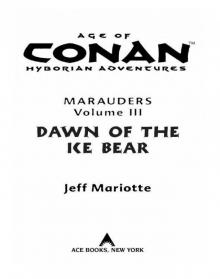 Dawn of the Ice Bear
Dawn of the Ice Bear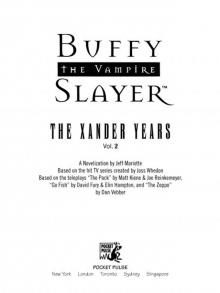 The Xander Years, Vol.2
The Xander Years, Vol.2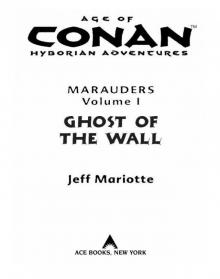 Ghost of the Wall
Ghost of the Wall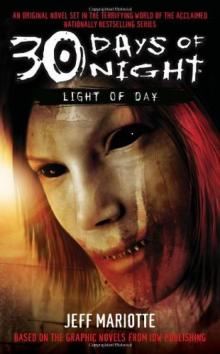 30 Days of Night: Light of Day
30 Days of Night: Light of Day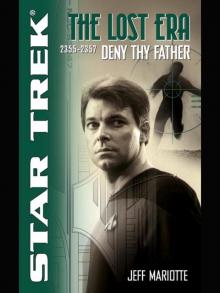 Deny Thy Father
Deny Thy Father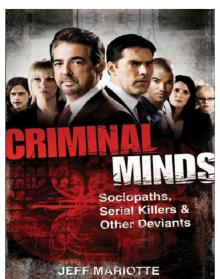 Criminal Minds
Criminal Minds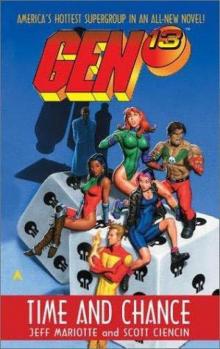 Time and Chance
Time and Chance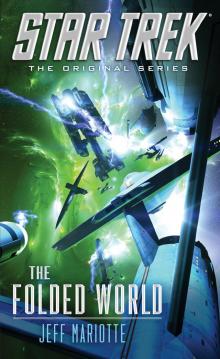 The Folded World
The Folded World Bolthole
Bolthole Narcos
Narcos Right to Die
Right to Die